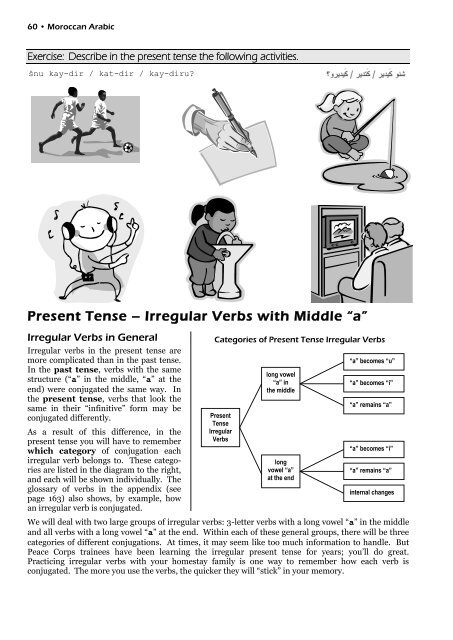Moroccan Arabic textbook 2011
Moroccan Arabic textbook 2011
Moroccan Arabic textbook 2011
Create successful ePaper yourself
Turn your PDF publications into a flip-book with our unique Google optimized e-Paper software.
60 • <strong>Moroccan</strong> <strong>Arabic</strong><br />
Exercise: Describe in the present tense the following activities.<br />
šnu kay-dir / kat-dir / kay-diru<br />
Present Tense – Irregular Verbs with Middle “a”<br />
Irregular Verbs in General<br />
Irregular verbs in the present tense are<br />
more complicated than in the past tense.<br />
In the past tense, verbs with the same<br />
structure (―a‖ in the middle, ―a‖ at the<br />
end) were conjugated the same way. In<br />
the present tense, verbs that look the<br />
same in their ―infinitive‖ form may be<br />
conjugated differently.<br />
As a result of this difference, in the<br />
present tense you will have to remember<br />
which category of conjugation each<br />
irregular verb belongs to. These categories<br />
are listed in the diagram to the right,<br />
and each will be shown individually. The<br />
glossary of verbs in the appendix (see<br />
page 163) also shows, by example, how<br />
an irregular verb is conjugated.<br />
Categories of Present Tense Irregular Verbs<br />
Present<br />
Tense<br />
Irregular<br />
Verbs<br />
long vowel<br />
“a” in<br />
the middle<br />
long<br />
vowel “a”<br />
at the end<br />
“a” becomes “u”<br />
“a” becomes “i”<br />
“a” remains “a”<br />
“a” becomes “i”<br />
“a” remains “a”<br />
internal changes<br />
We will deal with two large groups of irregular verbs: 3-letter verbs with a long vowel ―a‖ in the middle<br />
and all verbs with a long vowel ―a‖ at the end. Within each of these general groups, there will be three<br />
categories of different conjugations. At times, it may seem like too much information to handle. But<br />
Peace Corps trainees have been learning the irregular present tense for years; you‘ll do great.<br />
Practicing irregular verbs with your homestay family is one way to remember how each verb is<br />
conjugated. The more you use the verbs, the quicker they will ―stick‖ in your memory.


